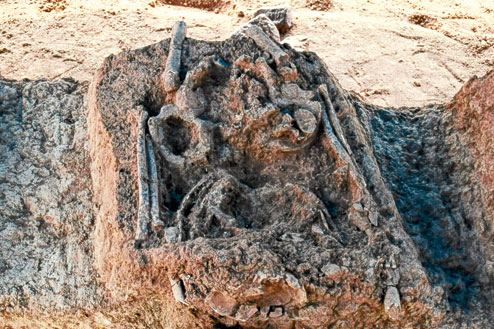TRAVELLING BACK IN TIME




Cuttack, May 27: Archaeologists and historians from the Ravenshaw University have unearthed a human skeleton, apart from some artefacts, presumed to be dating back to the Chalcolithic or early Iron Age from an excavation site at Talagada village, 40km from here.
With evidence of pottery belonging to the copper (Chalcolithic) and early Iron Age, historians feel that more findings are in the offing.
Assistant professor of the varsity's history department Umakanta Mishra said the burial ground (from where the skeleton was recovered) and the fifth layer of the index trench were at the same level.
"The artefacts from the fifth layer of the trench belong to the Iron Chalcolithic Age. The level of the burial ground and fifth layer of the trench, being the same, prove that the site belongs to the early Iron Age. Iron slag have been found aplenty at the site," said Mishra, who is also the field director for the excavation.
Circumstantial evidence suggests that the artefacts are nearly 4,000-year-old. During the excavation, researchers have found stone tools, pottery and animal bones from the site. The excavation work would continue for two more weeks.
"Till date, we have dug 11 layers in the index (primary) trench at the site, where the researchers and students of our department got several types of pottery in various shapes and sizes. But, the skeleton was discovered from a different patch of soil about 50 feet away from the index trench," he said.
The varsity's history professor Subrat Acharya, who is also the director of the excavation, said: "We have engaged research scholars and postgraduate students in the work, for which the state culture department has sanctioned Rs 2 lakh."
A research scholar said that within 2km of the excavation site at Talagada, there laid ruins of a historic fort in a reserve forest. Earlier, copper plates belonging to the Bhoumakar rulers were also found at the nearby Patalinga village.
Mishra also said the artefacts recovered from the site would be sent for carbon dating to either the Birbal Sahani Institute of Paleobotany, Lucknow, Physical Research Laboratory, Ahmedabad or Tata Institute of Fundamental Research, Mumbai.
Utkal University's anthropology professor Kishore Kumar Basa also told The Telegraph that the artefacts belonging to the Talagada site were probably of the Chalcolithic era or early Iron Age. He, however, added that it would be better to ascertain the age precisely after a detailed study by experts. Human skeletal biology expert Veena Mushrif-Tripathy from Deccan College, Pune, will examine the skeleton tomorrow.
The Pune-based expert came to the postgraduate department of anthropology, Utkal University, last year, to examine skeletons found from Baanga on the city outskirts. Three skeletons had been recovered from there during the 2013-14 excavations. Before that the Archaeological Survey of India (ASI) had unearthed a human skeleton from Golbai Sasan in 1991.










